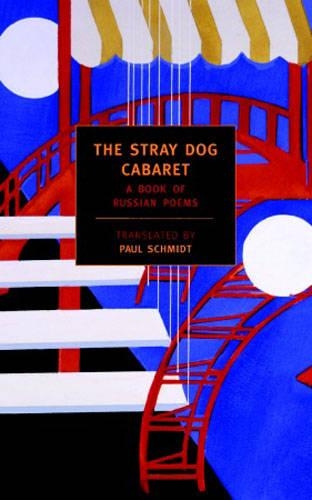
The Stray Dog Cabaret
(Paperback, Main)
Publishing Details
The Stray Dog Cabaret
By (Author) Translated By Paul Schmid
New York Review Books
NYRB Classics
15th December 2006
14th April 2007
Main
United States
Classifications
General
Non Fiction
891.71308
Commended for Literary Award (Poetry in Translation) 2007
Physical Properties
Paperback
168
Width 128mm, Height 203mm, Spine 10mm
175g
Description
In the years before the 1917 Russian Revolution, the Stray Dog cabaret in St. Petersburg was the haunt of poets, artists, and musicians, a place to meet, drink, read, brawl, celebrate, and stage performances of all kinds. It has since become a symbol of the extraordinary literary ferment of that time. It was then that Alexander Blok composed his apocalyptic sequence "Twelve"; that the futurists Velimir Khlebnikov and Vladimir Mayakovsky exploded language into bold new forms; that the lapidary lyrics of Osip Mandelstam and plangent love poems of Anna Akhmatova saw the light; that the electrifying Marina Tsvetaeva stunned and dazzled everyone. Boris Pasternak was also of this company, putting together his great youthful hymn to nature, My Sister, Life. It was a transforming moment-not just for Russian but for world poetry-and a short-lived one. Within little more than a decade, revolution and terror were to disperse, silence, and destroy almost all the poets of the Stray Dog cabaret.
Reviews
"On New Year's Day, 1912, a cabaret with the cock-a-snook name Stray Dog opened in St. Petersburg, Russia, and became the place where the avant-garde met, debated, performed, and otherwise presented itself to itself. Habitues included the greatest concentration of major poets in Russian history, all born between 1800 and 1895...This book conjures their group's initial passion, humor, and revolutionary zeal." --Booklist
Praise for Schmidt:
"He never translated from a language that he didn't know the way a poet knows languageHe understood what it meant for words to live inside an actor's body, what it meant for language to be embodied in space by a living breathing performer."The Boston Phoenix
Schmidt's translations of Chekhov have been successfully staged all over the U.S. by such theatrical directors as Lee Strasberg, Elizabeth Swados, Peter Sellars and Robert Wilson. Critics have hailed these translations as making Chekhov fully accessible to American audiences. They are also accurate -- Schmidt has been described as "the gold standard in Russian-English translation" by Michael Holquist of the Russian department at Yale University.From The Plays of Anton Chekhov
Author Bio
Paul Schmidt (1934-1999), translator, poet, actor, librettist, playwright, and essayist, was born in Brooklyn, the oldest of seven children. He received a degree from Colgate University in Russian studies in 1955 and, after a year of graduate work at Harvard, he moved to Paris, where he studied mime with Marcel Marceau and acting with Jacques Charon of the Comedie Francaise. Drafted in 1958, he served in the US Army Intelligence and on his release resumed his Russian studies; his doctoral thesis on "the stylized theater of V.E. Mejerxol'd" was published as Meyerhold at Work. For eleven years, Schmidt was a professor of Slavic languages at the University of Texas at Austin, where he won the Bromberg Award for Teaching Excellence. His Arthur Rimbaud: Complete Works was published in 1975, and translations of Russian poets, notably Marina Tsvetaeva, followed. A commission from the Dia Foundation supported his translations of Velimir Khlebnikov (four volumes published between 1985 and 1997), allowing him to leave academia and move to New York City. Working with the Yale Repertory Theatre, the American Repertory Theatre, the Guthrie, and other companies, he translated Euripides, Chekhov, Brecht, Genet, Gogol, Marivaux, and Mayakovsky, and wrote three plays of his own, winning the Helen Hayes and Kesselring awards for best play for Black Sea Follies. Providing text and often performing, he collaborated with the Wooster Group and with the avant-garde directors Robert Wilson, JoAnne Akalaitis, David Schweitzer, and Peter Sellars. He also acted in film and television, and in the 1970s devised "The Lost Art of Melodeclamation," a program of nineteenth-century works for voice and orchestra, which he toured and performed with the pianist Yvar Mikhashoff, who transposed the works for keyboard. The Plays of Anton Chekhov, Schmidt's translation of twelve of Chekhov's plays, was published in 1997. From 1993 until the end of his life, he taught translation and dramaturgy at the Yale School of Drama. Catherine Ciepiela is a professor of Russian at Amherst College, and the author of The Same Solitude, a study of the letters and poems exchanged by Marina Tsvetaeva and Boris Pasternak during their epistolary romance in the 1920s. Honor Moore's collections of poems are Red Shoes, Darling, and Memoir. She edited Amy Lowell: Selected Poems for the Library of America and is author of The White Blackbird, a life of her grandmother, the painter Margarett Sargent.
